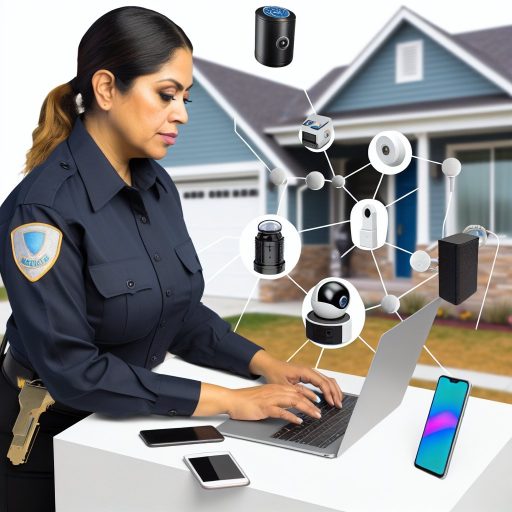Introduction to AI-Driven Virtual Tours in Real Estate
AI-driven virtual tours are revolutionizing property showings in real estate.
These tours use cutting-edge technology to enhance buyer engagement.
They provide immersive experiences without the need for physical visits.
Moreover, they save time and resources for both buyers and agents.
What Are AI-Driven Virtual Tours?
AI-driven virtual tours utilize artificial intelligence to create realistic experiences.
This technology captures high-quality images of properties.
Then, it stitches them together for a seamless viewing experience.
Additionally, it can incorporate 3D elements and interactive features.
The Benefits of Using AI in Real Estate Showings
- Enhanced accessibility for remote buyers.
- Increased engagement through interactive elements.
- Reduced scheduling conflicts and travel time.
- Ability to showcase properties anytime, anywhere.
Improving Buyer Decisions with AI Insights
AI technology provides valuable insights into buyer preferences.
This information helps agents tailor property presentations effectively.
It also allows for personalized recommendations based on past behaviors.
Consequently, buyers feel more confident in their choices.
Challenges and Considerations
Despite their benefits, AI-driven virtual tours also face challenges.
For example, technology access can be a barrier for some clients.
Additionally, maintaining the quality of virtual presentations is crucial.
Also, agents must be trained to use these tools effectively.
The Future of Virtual Tours in Real Estate
The future looks promising for AI-driven virtual tours.
As technology advances, these tours will become even more realistic.
Furthermore, integration with virtual reality could enhance experiences.
Ultimately, they will continue to transform the real estate market.
Benefits of AI Technology in Virtual Property Showings
Enhanced User Experience
AI-driven virtual tours offer an immersive experience for potential buyers.
They simulate real-life interactions by incorporating 3D visuals and audio.
Furthermore, these technologies provide detailed descriptions of each space.
This approach keeps users engaged and informed throughout the tour.
Time Efficiency
Virtual tours significantly reduce the time spent on property showings.
Buyers can explore multiple listings from the comfort of their home.
Consequently, agents can focus on high-priority leads and negotiations.
This efficiency boosts productivity for real estate professionals.
Wider Reach
AI technology allows real estate listings to reach a global audience.
Remote buyers can view properties without the need for travel.
This accessibility expands the potential market significantly.
Additionally, properties can gain attention from international investors.
Data-Driven Insights
AI can analyze user preferences and behaviors during virtual tours.
This data helps agents tailor their approach to individual buyers.
By understanding trends, they can showcase properties more effectively.
Predictive analytics also assist in pricing strategies and marketing efforts.
Cost-Effectiveness
AI-driven virtual tours reduce the costs associated with physical showings.
They eliminate travel expenses for both buyers and agents.
Furthermore, the need for staging multiple properties decreases.
This technology allows agents to offer high-quality presentations without breaking the bank.
How AI-Driven Virtual Tours Enhance Customer Engagement
Immersive Experience
AI-driven virtual tours provide an immersive experience for potential buyers.
These tours allow users to explore properties from the comfort of their homes.
Additionally, they create a realistic sense of space and layout.
This technology captures attention and maintains interest in listings.
Personalization
Many platforms offer personalizations based on user preferences.
This feature enables buyers to tailor their experiences.
As a result, customers feel more connected to the properties.
Furthermore, AI can recommend similar properties based on user behavior.
Increased Accessibility
AI-driven virtual tours make real estate more accessible to everyone.
Potential buyers with mobility issues benefit from this technology.
Additionally, international buyers can view properties without travel.
This feature broadens the market for sellers and agents alike.
Enhanced Communication
These tours facilitate improved communication between buyers and agents.
Agents can engage with clients during virtual tours in real-time.
This interactivity fosters relationships and builds trust.
Moreover, it allows for immediate feedback and questions during the tour.
Cost and Time Efficiency
By utilizing AI-driven virtual tours, agents save time and resources.
Agents can show multiple properties in a short period.
This efficiency is appealing to both buyers and sellers.
Consequently, it streamlines the overall property showing process.
Data Insights
AI tools gather valuable data about user interactions during tours.
This data can help agents understand buyer preferences better.
Additionally, insights can guide marketing strategies for listings.
Ultimately, data-driven decisions enhance customer engagement.
Discover More: Decoding The Role Of Virtual Property Tours On U.S. Real Estate Platforms
Key Features of AI-Powered Virtual Tour Platforms
AI-powered virtual tours offer an immersive experience for prospective buyers.
They help users visualize living in the property.
Furthermore, virtual tours replicate a physical walkthrough.
This technology engages viewers with high-quality, 360-degree visuals.
Real-Time Interaction
Virtual tour platforms provide real-time interaction capabilities.
Users can ask questions while exploring the property.
This feature enhances user engagement significantly.
Moreover, agents can guide virtual tours live.
Personalization Options
AI technology enables personalized tour experiences.
Users can tailor virtual tours based on their preferences.
This aspect allows potential buyers to focus on what matters most.
For instance, they can highlight specific rooms or features.
Data-Driven Insights
AI-driven platforms offer valuable data-driven insights.
These insights help agents understand buyer behavior.
Furthermore, analytics reveal which property features attract attention.
Such information optimizes future marketing strategies.
Accessibility Enhancements
Accessibility is a significant benefit of AI-powered virtual tours.
They allow users to view properties from anywhere in the world.
Additionally, those unable to attend physical showings can participate.
This aspect broadens the potential buyer pool significantly.
Integration with Other Technologies
AI-powered virtual tour platforms integrate seamlessly with other technologies.
For example, they can connect with CRM systems for streamlined management.
Additionally, integration with social media enhances property promotion.
This connectivity maximizes exposure for sellers.
Learn More: Uncovering Trends In U.S. Real Estate Technology Through Online Platforms
Comparison of Traditional Property Showings vs. AI Virtual Tours
Overview of Traditional Property Showings
Traditional property showings involve physical visits to homes.
Potential buyers meet with real estate agents on-site.
In-person viewings allow buyers to explore the property immediately.
These showings rely heavily on the personal touch of a real estate agent.
Moreover, buyers can ask questions and receive direct feedback.
Limitations of Traditional Showings
Traditional showings can be time-consuming for both buyers and sellers.
Scheduling conflicts often arise, leading to missed opportunities.
Furthermore, not all properties can be shown at convenient times.
Buyers may feel rushed during their visit, affecting their judgment.
This approach also limits the number of properties one can view in a day.
Introduction to AI Virtual Tours
AI-driven virtual tours provide an innovative way to explore properties.
These tours use advanced technology to create immersive experiences.
Buyers can view homes from the comfort of their own spaces.
Additionally, virtual tours are accessible at any time, enhancing convenience.
This technology allows users to revisit properties as needed.
Advantages of AI Virtual Tours
Virtual tours save time by eliminating travel to multiple locations.
Buyers can explore a wider selection of properties in less time.
The rich media elements engage users in unique ways.
Moreover, potential buyers can share tours with family and friends easily.
This collaborative approach aids in decision-making.
Enhanced Engagement Through Technology
AI virtual tours utilize engaging visuals and interactive features.
These elements capture buyers’ attention more effectively.
Advanced technology allows for 360-degree perspectives and floor plan layouts.
Such features enhance understanding of the property’s space and layout.
Additionally, AI algorithms can suggest properties based on user preferences.
Cost-Effectiveness and Efficiency
Using virtual tours can reduce marketing costs for sellers.
Properties can be showcased without needing constant in-person visits.
For agents, this innovation streamlines processes and improves efficiency.
Overall, virtual tours make real estate transactions more cost-effective.
Both buyers and sellers benefit from saved resources and time.
Explore Further: AI Chatbots for Real Estate Customer Service Solutions

Case Studies: Successful Implementations of AI Virtual Tours
Innovative Solutions in Residential Properties
A leading real estate firm, NextGen Realty, adopted AI-driven virtual tours last year.
This strategy significantly increased property engagement from potential buyers.
Clients enjoyed immersive experiences from the comfort of their homes.
Feedback indicated that virtual tours saved time and enhanced decision-making.
Subsequently, NextGen Realty reported a 30% rise in closing rates.
Commercial Property Success Stories
This year, UrbanSpaces utilized AI virtual tours for commercial listings.
The firm showcased various office spaces in prime locations.
Interactive features allowed potential tenants to visualize their future setups.
UrbanSpaces found that clients felt more informed and confident in their selections.
Consequently, they reported an increase of over 40% in inquiries.
Enhanced Client Experiences
TechHomes introduced AI virtual tours to enhance client services.
They provided tailored experiences that highlighted unique property features.
Real-time modifications allowed clients to visualize personal preferences immediately.
As a result, TechHomes achieved higher satisfaction ratings among clients.
This approach also fostered stronger relationships through personalized interactions.
Measurable Impacts on Sales
OpenDoor Realty implemented AI virtual tours across their portfolio.
This transition led to a remarkable decrease in property time on the market.
Virtual walkthroughs attracted a broader audience than traditional methods.
OpenDoor Realty noted a 25% faster sales process overall.
These statistics underscore the effectiveness of AI-driven solutions in real estate.
You Might Also Like: Facebook Ads for Real Estate Agents to Drive Targeted Buyer Traffic
Future Trends in AI and Virtual Tour Technology in Real Estate
Advancements in AI Technology
AI technology continues to evolve at an unprecedented rate.
Machine learning models are getting better at analyzing property data.
This enables agents to offer personalized recommendations to clients.
In addition, AI can predict market trends more accurately.
These insights help investors make informed decisions quickly.
Integration of Virtual Reality
Virtual reality (VR) is becoming more accessible for real estate agents.
This technology allows potential buyers to experience properties remotely.
Furthermore, VR tours create immersive experiences for users.
They can explore every corner of a home without leaving their couch.
As a result, clients feel more confident in their purchasing decisions.
Enhanced User Experience with Augmented Reality
Augmented reality (AR) is enhancing traditional property showings.
Clients can visualize their furniture in new spaces through AR apps.
This leads to a more interactive and engaging experience.
Furthermore, AR can highlight features that might go unnoticed.
Ultimately, it helps buyers see a property’s full potential.
Data-Driven Insights for Buyers and Sellers
Data analytics tools are transforming how real estate operates.
These tools analyze buyer preferences and market dynamics.
Thus, they provide agents with vital information for pricing strategies.
Moreover, sellers can optimize their listings based on market trends.
This leads to quicker sales and better pricing outcomes.
Focus on Sustainability
Green technology is gaining traction in the real estate sector.
AI can identify and promote eco-friendly properties to buyers.
This aligns with growing consumer demands for sustainability.
Additionally, virtual tours can showcase energy-efficient features effectively.
Ultimately, sustainability becomes a selling point in listings.
Increased Accessibility Through Technology
Technology is making property viewings more accessible to everyone.
Virtual tours allow individuals with mobility challenges to explore homes.
This breaks down barriers in the home-buying process.
Moreover, 24/7 availability of online tours provides convenience.
Clients no longer have to work around agents’ schedules.
Challenges and Considerations for Implementing AI in Virtual Showings
Technological Limitations
Implementing AI in virtual showings can pose significant technological challenges.
Many current systems struggle with high-quality image rendering.
Additionally, the integration of AI with existing platforms remains complex.
Users may encounter software bugs or glitches during showings.
Furthermore, bandwidth issues can affect the user experience as well.
High Costs of Implementation
Investing in AI technology requires considerable financial resources.
Companies must allocate budgets for not only software but also hardware.
Ongoing maintenance and updates add to these costs over time.
The return on investment may take longer than expected for some stakeholders.
As a result, some businesses may hesitate to adopt AI tools readily.
User Experience and Training
User experience becomes crucial when deploying AI-driven virtual tours.
Effectively training agents and clients on new technologies is essential.
Some users may find AI interfaces less intuitive than traditional methods.
Providing thorough training sessions can alleviate potential frustrations.
Additionally, gathering feedback helps improve the technology over time.
Data Privacy and Security Issues
AI tools often require access to sensitive data for optimal functioning.
Data privacy becomes a paramount concern for both clients and companies.
Ensuring compliance with regulations adds complexities to implementations.
Stakeholders must prioritize data protection through robust security measures.
Trust in AI systems hinges on transparent data handling practices.
Market Competition
As AI technology advances, competition in the real estate sector intensifies.
Companies must continuously innovate to stay relevant in this market.
Failing to adopt cutting-edge tools can lead to a loss of clients.
Moreover, established firms may have resources to outpace smaller businesses.
Therefore, staying informed about trends is essential for success.
Additional Resources
How I became a real estate agent in 60 days | Suzana John posted …
How Technology Is Shaping the Real Estate Market: Key Trends to …




